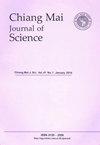Evaluation of Antifungal Activity from Bacillus subtilis strain AS80 Against Pathogenic Fungi Isolated from Hass Avocado Fruits
IF 0.8
4区 综合性期刊
Q3 MULTIDISCIPLINARY SCIENCES
引用次数: 0
Abstract
F ruit rot and anthracnose are the main diseases in avocado fruits caused by fungal species. Solving this problem with chemical reagents has led to human health and pollution problems. Therefore, this study was aimed to select antagonistic bacteria to control those pathogenic fungi. The pathogenic fungi were isolated from avocado fruit occurred fruit rot or anthracnose symptoms. Based on morphological characteristics and the BLASTn results of sequences of the internal transcribed spacer of ribosomal DNA, the obtained fungal isolates belonged to three fungal genera, namely Fusarium, Lasiodiplodia and Colletotrichum, which was the most commonly occurring. Pathogenicity tests were evaluated on avocado fruit. Then the rhizosphere bacteria were isolated from the avocado rhizosphere. To study antagonistic activity, 101 bacterial isolates were cultured with five fungal pathogens using dual culture technique. The bacterial isolate AS80 exhibited high potential to against Fusarium sp. (61.7%), Lasiodiplodia sp. (66.7%) and Colletotrichum sp. (74.1%). The strain AS80 was used to evaluate the efficacy control of Fusarium sp. on “Hass” avocado fruit. The in vivo evaluation revealed that AS80 showed high efficacy against Fusarium sp. The 16s ribosomal DNA sequencing indicated that AS80 was similar to Bacillus subtilis (99.53 %). Further study under field conditions should be done to validate their efficacy.枯草芽孢杆菌AS80对牛油果病原菌的抑菌活性评价
果腐病和炭疽病是由真菌引起的牛油果主要病害。用化学试剂解决这个问题已经导致了人类健康和污染问题。因此,本研究旨在筛选拮抗菌来控制这些致病真菌。从牛油果果实中分离到病原菌,出现果实腐烂或炭疽病症状。根据形态特征和核糖体DNA内转录间隔段序列的BLASTn结果,获得的真菌分离物属于3个真菌属,即镰刀菌属(Fusarium)、Lasiodiplodia和炭黑菌属(Colletotrichum),其中最常见。对牛油果进行了致病性评价。然后从牛油果根际分离根际细菌。采用双重培养技术对101株分离菌与5种真菌病原菌进行了拮抗活性研究。分离菌株AS80对镰刀菌(61.7%)、Lasiodiplodia sp.(66.7%)和炭疽病菌(74.1%)具有较高的杀灭潜力。采用菌株AS80对“哈斯”鳄梨果实进行了镰刀菌防效评价。体内鉴定结果表明,AS80对镰刀菌具有较高的抑菌活性。16s核糖体DNA测序结果表明,AS80与枯草芽孢杆菌(Bacillus subtilis)相似(99.53%)。需要进一步的野外研究来验证其有效性。
本文章由计算机程序翻译,如有差异,请以英文原文为准。
求助全文
约1分钟内获得全文
求助全文
来源期刊

Chiang Mai Journal of Science
MULTIDISCIPLINARY SCIENCES-
CiteScore
1.00
自引率
25.00%
发文量
103
审稿时长
3 months
期刊介绍:
The Chiang Mai Journal of Science is an international English language peer-reviewed journal which is published in open access electronic format 6 times a year in January, March, May, July, September and November by the Faculty of Science, Chiang Mai University. Manuscripts in most areas of science are welcomed except in areas such as agriculture, engineering and medical science which are outside the scope of the Journal. Currently, we focus on manuscripts in biology, chemistry, physics, materials science and environmental science. Papers in mathematics statistics and computer science are also included but should be of an applied nature rather than purely theoretical. Manuscripts describing experiments on humans or animals are required to provide proof that all experiments have been carried out according to the ethical regulations of the respective institutional and/or governmental authorities and this should be clearly stated in the manuscript itself. The Editor reserves the right to reject manuscripts that fail to do so.
 求助内容:
求助内容: 应助结果提醒方式:
应助结果提醒方式:


